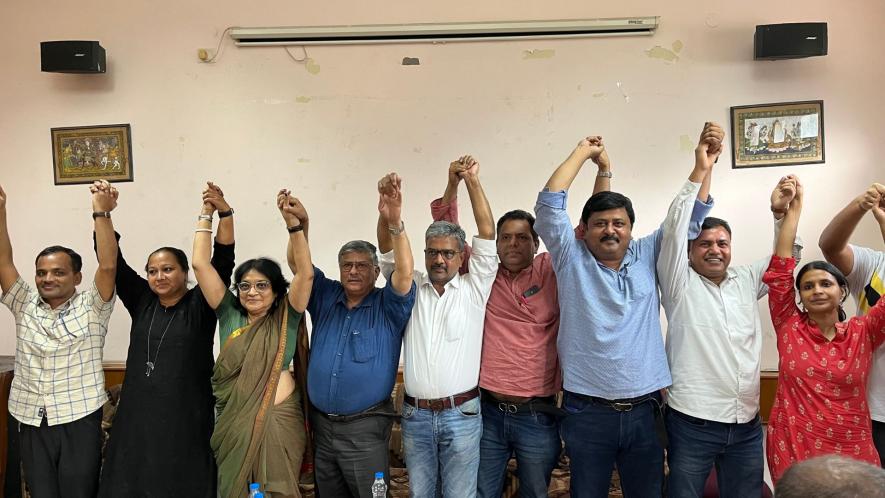DU: Teachers Decry Graded Autonomy in EC Meet, Dub it ‘Sheer Privatisation’

New Delhi: The awarding of category-I status under graded autonomy to Delhi University by the University Grants Commission was vehemently opposed by Executive Council members Seema Das and Ashok Aggarwal after it was brought up as a reporting item in the meeting on Friday.
The teachers maintained that the guidelines put by the regulator make it mandatory for institutions to generate their own funds to run the courses and open the gates towards privatisation in publicly funded institutions.
Addressing the press conference at the University Guest House, Nandita Narain, former president of the Delhi University Teachers Association (DUTA), said that the whole agenda in the Executive Council (EC) meeting was introduced as a reporting matter. In contrast, the elected teachers demanded its introduction as a substantive matter.
She said graded autonomy status must be read with provisions of the New Education Policy (NEP) which clears the air around funding of the institutions. The graded autonomy status of the university means that it will have to generate its own funds for salaries, promotions, pensions and maintenance.
“If the university wants to start its own courses, it is very clear from the instance of law faculty that these courses will be expensive. Delhi University and its colleges have been publicly funded institutions where students from every community, despite their economic standing, could come and get higher education. We already know that the reservation word does not appear a single time in the NEP document. Even if implemented in these self-financing courses, who will be able to benefit is a serious question,” she added.
Aditya Narain Mishra, DUTA presidential Candidate of a joint alliance of 10 organisations and individuals, said self-financing courses were just the beginning and the money collected from tuition fees would not be sufficient to run the institutions and pay salaries. The elections for the DUTA are scheduled on September 27.
Mishra said, “Our representatives in the executive council have to sit in the well to request that the item is introduced as substantive items. She is asking that this item be discussed in the staff council so that a debate could begin over its implications in the larger society. Does our society want such courses which nobody can afford?”
“It is related to students, teachers and higher education. It will also pave the way towards privatisation of education,” he added.
Mishra was referring to the gazette notification on the graded autonomy of category-I universities. The point of contention remains in the paragraph that reads, “Universities, while following the pay scales as laid down by the Commission, shall build in an incentive structure to attract talented faculty, with the condition that the incentive structure shall have to be paid from their own revenue sources and not from Commission or Government funds. Such incentive structure shall be strictly merit-based with clearly defined, transparent and objective criteria and shall not be universal.”
Ramanand, who addressed the press conference as the representative of INTEC, said that the new mechanism suggests the formation of a Board of Governors which will look after institutions and remain the final authority on syllabus, salaries and fees.
“I come from Manipur and could study here because the Delhi University offered affordable education. The first-generation learners will simply vanish if the proposed structure is imposed on the university,” he said.
The teachers further said, “The ongoing delays in payment of salaries, pensions, etc., even in University colleges, is an ominous signal of the times to come. Massive fee hikes will follow, exacerbating the exclusionary tendencies already initiated by the CUET process. Even if the constitutionally mandated provision of the reservation is retained (though it finds no mention in the NEP document), students belonging to deprived sections will be excluded through the back door of high fees.”
A statement from teachers' bodies said, “A number of academically vacuous courses have been introduced in the name of most Value Added Courses and Skill Enhancement Courses, which add neither to values nor skills and leave students too exhausted to focus on the core academic disciplines. On the other hand, internal assessment has been increased from 25 to 45%, with a new component of continuous assessment. This, given the massive reduction in teaching-tutorial-practical time, is an academic fraud. None of these changes were brought after consultation with teachers. Teachers, as parents, are extremely concerned about the steep decline in the quality of the teaching-learning processes and the courses being offered.”
First Fallout After Delhi Government Act
The teachers further highlighted that higher education had witnessed the first fallout of the Government of National Capital Territory of Delhi (Amendment) Act, where the allocated money of Rs 100 crore was not released in the wake of the ongoing debate over control of the bureaucracy, resulting in delays of salaries for months. The centre wishes to discredit state governments by holding files unnecessarily.
The letter by Atishi, Minister of Education to Secretary Higher Education, read, “On 28th June 2023, I approved the release of Rs 100 Cr as the second quarterly grant was announced. But this fund has not reached the colleges yet despite one and half months having lapsed…Hence, the second quarterly grant of Rs 100 Cr should be released without any further delay, and it must be found out the reason for such a delay between the announcement and the implementation. The faculty and the ministerial staff of these colleges cannot be allowed to suffer due to administrative technicalities, and the Finance Department should have a facilitatory approach over these financial issues.”
Get the latest reports & analysis with people's perspective on Protests, movements & deep analytical videos, discussions of the current affairs in your Telegram app. Subscribe to NewsClick's Telegram channel & get Real-Time updates on stories, as they get published on our website.























